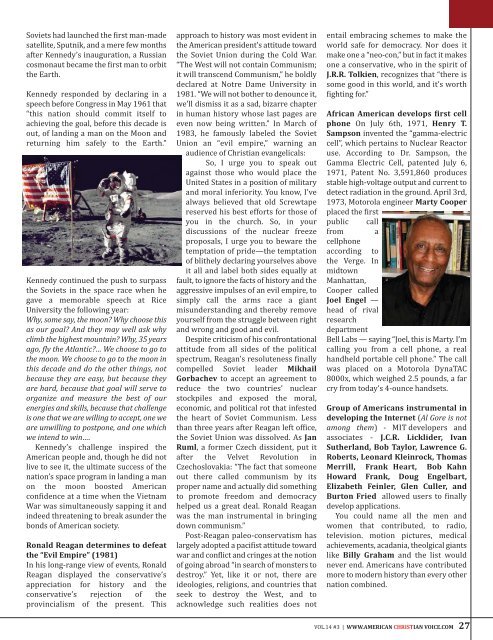Vol.14 No.3
Intelligent, Inspirational & Fun! America Was Always Great
Intelligent, Inspirational & Fun!
America Was Always Great
Create successful ePaper yourself
Turn your PDF publications into a flip-book with our unique Google optimized e-Paper software.
Soviets had launched the first man-made<br />
satellite, Sputnik, and a mere few months<br />
after Kennedy’s inauguration, a Russian<br />
cosmonaut became the first man to orbit<br />
the Earth.<br />
Kennedy responded by declaring in a<br />
speech before Congress in May 1961 that<br />
“this nation should commit itself to<br />
achieving the goal, before this decade is<br />
out, of landing a man on the Moon and<br />
returning him safely to the Earth.”<br />
Kennedy continued the push to surpass<br />
the Soviets in the space race when he<br />
gave a memorable speech at Rice<br />
University the following year:<br />
Why, some say, the moon? Why choose this<br />
as our goal? And they may well ask why<br />
climb the highest mountain? Why, 35 years<br />
ago, fly the Atlantic?… We choose to go to<br />
the moon. We choose to go to the moon in<br />
this decade and do the other things, not<br />
because they are easy, but because they<br />
are hard, because that goal will serve to<br />
organize and measure the best of our<br />
energies and skills, because that challenge<br />
is one that we are willing to accept, one we<br />
are unwilling to postpone, and one which<br />
we intend to win….<br />
Kennedy’s challenge inspired the<br />
American people and, though he did not<br />
live to see it, the ultimate success of the<br />
nation’s space program in landing a man<br />
on the moon boosted American<br />
confidence at a time when the Vietnam<br />
War was simultaneously sapping it and<br />
indeed threatening to break asunder the<br />
bonds of American society.<br />
Ronald Reagan determines to defeat<br />
the “Evil Empire” (1981)<br />
In his long-range view of events, Ronald<br />
Reagan displayed the conservative’s<br />
appreciation for history and the<br />
conservative’s rejection of the<br />
provincialism of the present. This<br />
approach to history was most evident in<br />
the American president’s attitude toward<br />
the Soviet Union during the Cold War.<br />
“The West will not contain Communism;<br />
it will transcend Communism,” he boldly<br />
declared at Notre Dame University in<br />
1981. “We will not bother to denounce it,<br />
we’ll dismiss it as a sad, bizarre chapter<br />
in human history whose last pages are<br />
even now being written.” In March of<br />
1983, he famously labeled the Soviet<br />
Union an “evil empire,” warning an<br />
audience of Christian evangelicals:<br />
So, I urge you to speak out<br />
against those who would place the<br />
United States in a position of military<br />
and moral inferiority. You know, I’ve<br />
always believed that old Screwtape<br />
reserved his best efforts for those of<br />
you in the church. So, in your<br />
discussions of the nuclear freeze<br />
proposals, I urge you to beware the<br />
temptation of pride—the temptation<br />
of blithely declaring yourselves above<br />
it all and label both sides equally at<br />
fault, to ignore the facts of history and the<br />
aggressive impulses of an evil empire, to<br />
simply call the arms race a giant<br />
misunderstanding and thereby remove<br />
yourself from the struggle between right<br />
and wrong and good and evil.<br />
Despite criticism of his confrontational<br />
attitude from all sides of the political<br />
spectrum, Reagan’s resoluteness finally<br />
compelled Soviet leader Mikhail<br />
Gorbachev to accept an agreement to<br />
reduce the two countries’ nuclear<br />
stockpiles and exposed the moral,<br />
economic, and political rot that infested<br />
the heart of Soviet Communism. Less<br />
than three years after Reagan left office,<br />
the Soviet Union was dissolved. As Jan<br />
Ruml, a former Czech dissident, put it<br />
after the Velvet Revolution in<br />
Czechoslovakia: “The fact that someone<br />
out there called communism by its<br />
proper name and actually did something<br />
to promote freedom and democracy<br />
helped us a great deal. Ronald Reagan<br />
was the man instrumental in bringing<br />
down communism.”<br />
Post-Reagan paleo-conservatism has<br />
largely adopted a pacifist attitude toward<br />
war and conflict and cringes at the notion<br />
of going abroad “in search of monsters to<br />
destroy.” Yet, like it or not, there are<br />
ideologies, religions, and countries that<br />
seek to destroy the West, and to<br />
acknowledge such realities does not<br />
entail embracing schemes to make the<br />
world safe for democracy. Nor does it<br />
make one a “neo-con,” but in fact it makes<br />
one a conservative, who in the spirit of<br />
J.R.R. Tolkien, recognizes that “there is<br />
some good in this world, and it’s worth<br />
fighting for.”<br />
African American develops first cell<br />
phone On July 6th, 1971, Henry T.<br />
Sampson invented the “gamma-electric<br />
cell”, which pertains to Nuclear Reactor<br />
use. According to Dr. Sampson, the<br />
Gamma Electric Cell, patented July 6,<br />
1971, Patent No. 3,591,860 produces<br />
stable high-voltage output and current to<br />
detect radiation in the ground. April 3rd,<br />
1973, Motorola engineer Marty Cooper<br />
placed the first<br />
public call<br />
from a<br />
cellphone<br />
according to<br />
the Verge. In<br />
midtown<br />
Manhattan,<br />
Cooper called<br />
Joel Engel —<br />
head of rival<br />
research<br />
department<br />
Bell Labs — saying “Joel, this is Marty. I’m<br />
calling you from a cell phone, a real<br />
handheld portable cell phone.” The call<br />
was placed on a Motorola DynaTAC<br />
8000x, which weighed 2.5 pounds, a far<br />
cry from today’s 4-ounce handsets.<br />
Group of Americans instrumental in<br />
developing the Internet (Al Gore is not<br />
among them) - MIT developers and<br />
associates - J.C.R. Licklider, Ivan<br />
Sutherland, Bob Taylor, Lawrence G.<br />
Roberts, Leonard Kleinrock, Thomas<br />
Merrill, Frank Heart, Bob Kahn<br />
Howard Frank, Doug Engelbart,<br />
Elizabeth Feinler, Glen Culler, and<br />
Burton Fried allowed users to finally<br />
develop applications.<br />
You could name all the men and<br />
women that contributed, to radio,<br />
television. motion pictures, medical<br />
achievements, acadania, theolgical giants<br />
like Billy Graham and the list would<br />
never end. Americans have contributed<br />
more to modern history than every other<br />
nation combined.<br />
VOL.14 #3 | WWW.AMERICAN CHRISTIAN VOICE.COM 27





